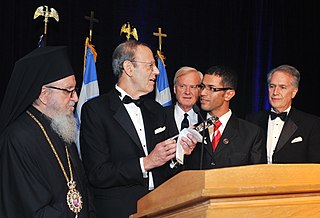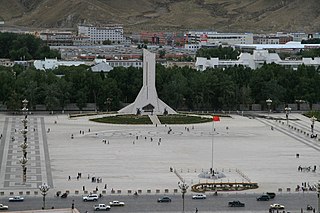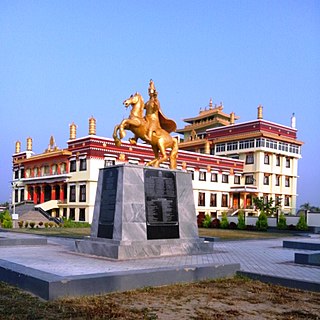Human rights in the People's Republic of China are poor, as per reviews by international bodies, such as human rights treaty bodies and the United Nations Human Rights Council's Universal Periodic Review. The Chinese Communist Party (CCP), the government of the People's Republic of China (PRC), their supporters, and other proponents claim that existing policies and enforcement measures are sufficient to guard against human rights abuses. However, other countries, international non-governmental organizations (NGOs) including Human Rights in China and Amnesty International, and citizens, lawyers, and dissidents inside the country, state that the authorities in mainland China regularly sanction or organize such abuses.

The National Endowment for Democracy (NED) is a quasi-autonomous non-governmental organization in the United States founded in 1983 with the stated aim of advancing democracy worldwide, by promoting political and economic institutions, such as political groups, business groups, trade unions, and free markets.
Radio Free Asia (RFA) is a news service that broadcasts radio programs and publishes online news, information, and commentary for its audiences in Asia. The service, which provides editorially independent reporting, has the stated mission of providing accurate and uncensored reporting to countries in Asia that have poor media environments and limited protections for speech and press freedom. RFA is American government-funded, operates as a non-profit corporation, headquartered in Washington, D.C, with news bureaus and journalists in Asia, Europe, and Australia.

The Uyghur American Association is a prominent Uyghur American non-profit advocacy organization based in Washington, D. C. in the United States. It was established in 1998 by a group of Uyghur overseas activists to raise the public awareness of the Uyghur people, who primarily reside in Xinjiang, China, also known as East Turkestan. The Uyghur American Association is an affiliate organization of the World Uyghur Congress and works to promote the Uyghur culture and improved human rights conditions for Uyghurs.
Terrorism in China refers to the use of terrorism to cause a political or ideological change in the People's Republic of China. While there is no international or legally binding definition of terrorism, internationally recognized organizations such as the UN and EU have defined terrorism in various resolutions. In the cultural setting of China, the term is relatively new and ambiguous.

The history of Tibet from 1950 to the present includes the Chinese annexation of Tibet, during which Tibetan representatives signed the controversial Seventeen Point Agreement following the Battle of Chamdo and establishing an autonomous administration led by the 14th Dalai Lama under Chinese sovereignty. Subsequent socialist reforms and other unpopular policies of the Chinese Communist Party led to armed uprisings, eventually assisted by the CIA, and their violent suppression. During the 1959 Tibetan uprising, the 14th Dalai Lama escaped to northern India for fear of being captured by Chinese forces. He formed the Central Tibetan Administration and rescinded the Seventeen Point Agreement. In 1965, the majority of Tibet's land mass, including all of U-Tsang and parts of Kham and Amdo, was established as the Tibet Autonomous Region. Tibetans suffered along with the rest of China during the Great Chinese Famine and the Cultural Revolution under episodes of starvation, religious repression, destruction of cultural sites, forced labour, and political persecution. US-China rapprochement in the 1970s saw an end to Washington's support for Tibetan guerillas. Amid broader reforms across the country, China adopted policies to improve conditions in Tibet. Since the 2000s, it has invested heavily in the region but generated controversies due to the sinicization of Tibet. Human rights abuses remain a concern especially where it comes to freedom of religion and political prisoners.
Radio jamming in China is a form of censorship in the People's Republic of China that involves deliberate attempts by state or Communist Party organs to interfere with radio broadcasts. In most instances, radio jamming targets foreign broadcasters, including Voice of America (VOA), Radio Free Asia, the BBC World Service, Sound of Hope (SOH) and stations based in Taiwan.

The 2008 Tibetan unrest, also referred to as the 2008 Tibetan uprising in Tibetan media, was a series of protests and demonstrations over the Chinese government's treatment and persecution of Tibetans. Protests in Lhasa, the capital of Tibet, by monks and nuns on 10 March have been viewed as the start of the demonstrations. Numerous protests and demonstrations were held to commemorate the 49th anniversary of the 1959 Tibetan Uprising Day, when the 14th Dalai Lama escaped from Tibet. The protests and demonstrations spread spontaneously to a number of monasteries and throughout the Tibetan plateau, including into counties located outside the designated Tibet Autonomous Region.

Tibetan Uprising Day, observed on March 10, commemorates the 1959 Tibetan uprising which began on March 10, 1959, and the Women's Uprising Day of March 12, 1959, involving thousands of women, against the presence of the People's Republic of China in Tibet.

The sinicization of Tibet includes the programs and laws of the government of the People's Republic of China and the Chinese Communist Party (CCP) to force cultural assimilation in Tibetan areas of China, including the Tibet Autonomous Region and the surrounding Tibetan-designated autonomous areas. The efforts are undertaken by China in order to remake Tibetan culture into mainstream Chinese culture.

The Tibetan diaspora is the relocation of Tibetan people from Tibet, their country of origin, to other nation states to live as exiles and refugees in communities. The diaspora of Tibetan people began in the early 1950s, peaked after the 1959 Tibetan uprising, and continues.

The World Uyghur Congress (WUC) is a US funded international organization of exiled Uyghur groups that claims to "represent the collective interest of the Uyghur people" both inside and outside of the Xinjiang Uyghur Autonomous Region of the People's Republic of China. The World Uyghur Congress claims to be a nonviolent and peaceful movement that opposes what it considers to be the Chinese occupation of East Turkestan (Xinjiang) and advocates rejection of totalitarianism, religious intolerance and terrorism as an instrument of policy. It has been called the "largest representative body of Uyghurs around the world" and uses more moderate methods of human rights advocacy to influence the Chinese government within the international community in contrast to more radical Uyghur organizations.
Human rights in Tibet has been a subject of intense international scrutiny and debate, particularly since the annexation of Tibet by the People's Republic of China. Before the 1950s, Tibet's social structure was marked by inequality and described as a caste-like system or, controversially, as serfdom. Severe punishments, including permanent mutilation of body parts, were common, although capital punishment was banned in 1913. Muslim warlord Ma Bufang caused widespread destruction and deaths in Amdo, which is located northeast of Central Tibet.

Chen Quanguo is a Chinese retired politician who was the Chinese Communist Party Committee Secretary of Tibet Autonomous Region from 2011 to 2016 and of the Xinjiang Uyghur Autonomous Region from 2016 to 2021, making him the only person to serve as the Party Secretary for both autonomous regions. Between 2017 and 2022, he was a member of the 19th Politburo of the Chinese Communist Party and was also Political Commissar of the Xinjiang Production and Construction Corps concurrently with his position as Xinjiang Party Secretary.
China Tibet Broadcasting is a broadcast network headquartered in Lhasa, Tibet Autonomous Region of the People's Republic of China. Its radio programmes were founded in 1959. Its English language audio broadcast is called Holy Tibet, broadcasts at 07:00 and 16:00 UTC every day.

Tibet on Fire: Self-Immolations Against Chinese Rule is a book written by Tsering Woeser, published by Verso Books in 2016. The book is a contemporary look at a major social and human rights problem caused by the forced integration of Tibetan and Chinese societies, and due to empirically repressive policies of the Chinese (PRC) government.

Antireligious campaigns in China are a series of policies and practices taken as part of the Chinese Communist Party's official promotion of state atheism, coupled with its persecution of people with spiritual or religious beliefs, in the People's Republic of China. Antireligious campaigns were launched in 1949, after the Chinese Communist Revolution, and they continue to be waged against Buddhists, Christians, Muslims, and members of other religious communities in China.

Michael C. Davis is an American legal scholar currently serving as a global fellow at the Woodrow Wilson International Center for Scholars. He is also an affiliate research scholar at the U.S.-Asia Law Institute at New York University, a research associate at Columbia University, and a professor of law and international affairs at O.P. Jindal Global University.

The Tibet Action Institute is an organization that uses digital communication tools and strategic nonviolent action to strengthen the capacity and effectiveness of the Tibet movement in the digital era, co-founded by Lhadon Tethong and Nathan Fretias in 2009. The organization helps to identify, trace, and resist malware and other online attacks launched against Tibetan activists.
Transnational repression by China refers to efforts by the government of the People's Republic of China to exert control and silence dissent beyond its national borders. Transnational repression targets groups and individuals perceived as threats to or critics of the Chinese Communist Party (CCP). The methods include digital surveillance, physical intimidation, coercion, and misuse of international legal systems.













